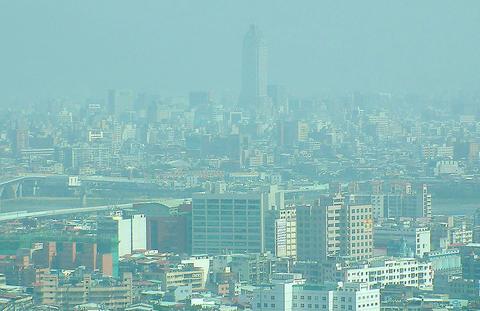Air quality across Taiwan took a turn for the worse yesterday as the country came under the influence of a sandstorm from China, increasing the volume of floating particles in the air.
Statistics collected by the Environmental Protection Administration (EPA) yesterday morning showed up to three times the normal volume of particles in the air in Tamshui, Yangmingshan and Pali, all in northern Taiwan.

PHOTO: CNA
The air in Pali measured 158 micrograms per cubic meter, whereas Yangmingshan and Tamshui measured 110 and 119 micrograms respectively.
The normal particle volume in Taiwan is between 50 and 60 micrograms per cubic meter, according to the EPA.
Central and southern Taiwan also began to feel the effect of the sandstorm beginning yesterday afternoon.
This is the first Chinese sandstorm to affect Taiwan this year.
The EPA said particle volume in northern Taiwan may decrease slightly this morning, but may rise again as another sandstorm begins to impact Taiwan tomorrow.
The EPA has advised people with respiratory and cardiovascular problems, elderly people and children to avoid going outdoors or taking strenuous outdoor exercises.
Those who have to go out should wear masks, the EPA said.
It is expected that Taiwan will be completely free from the sandstorm's influence by late today, before coming under the influence of another Chinese sandstorm tomorrow, EPA officials said.
The impact on Taiwan of sandstorms from China has become increasingly serious in recent years, the EPA officials said, adding that such sandstorms most frequently affect the nation in the March to May period.

The brilliant blue waters, thick foliage and bucolic atmosphere on this seemingly idyllic archipelago deep in the Pacific Ocean belie the key role it now plays in a titanic geopolitical struggle. Palau is again on the front line as China, and the US and its allies prepare their forces in an intensifying contest for control over the Asia-Pacific region. The democratic nation of just 17,000 people hosts US-controlled airstrips and soon-to-be-completed radar installations that the US military describes as “critical” to monitoring vast swathes of water and airspace. It is also a key piece of the second island chain, a string of

A magnitude 5.9 earthquake that struck about 33km off the coast of Hualien City was the "main shock" in a series of quakes in the area, with aftershocks expected over the next three days, the Central Weather Administration (CWA) said yesterday. Prior to the magnitude 5.9 quake shaking most of Taiwan at 6:53pm yesterday, six other earthquakes stronger than a magnitude of 4, starting with a magnitude 5.5 quake at 6:09pm, occurred in the area. CWA Seismological Center Director Wu Chien-fu (吳健富) confirmed that the quakes were all part of the same series and that the magnitude 5.5 temblor was

The Central Weather Administration has issued a heat alert for southeastern Taiwan, warning of temperatures as high as 36°C today, while alerting some coastal areas of strong winds later in the day. Kaohsiung’s Neimen District (內門) and Pingtung County’s Neipu Township (內埔) are under an orange heat alert, which warns of temperatures as high as 36°C for three consecutive days, the CWA said, citing southwest winds. The heat would also extend to Tainan’s Nansi (楠西) and Yujing (玉井) districts, as well as Pingtung’s Gaoshu (高樹), Yanpu (鹽埔) and Majia (瑪家) townships, it said, forecasting highs of up to 36°C in those areas

IN FULL SWING: Recall drives against lawmakers in Hualien, Taoyuan and Hsinchu have reached the second-stage threshold, the campaigners said Campaigners in a recall petition against Chinese Nationalist Party (KMT) Legislator Yen Kuan-heng (顏寬恒) in Taichung yesterday said their signature target is within sight, and that they need a big push to collect about 500 more signatures from locals to reach the second-stage threshold. Recall campaigns against KMT lawmakers Johnny Chiang (江啟臣), Yang Chiung-ying (楊瓊瓔) and Lo Ting-wei (羅廷瑋) are also close to the 10 percent threshold, and campaigners are mounting a final push this week. They need about 800 signatures against Chiang and about 2,000 against Yang. Campaigners seeking to recall Lo said they had reached the threshold figure over the